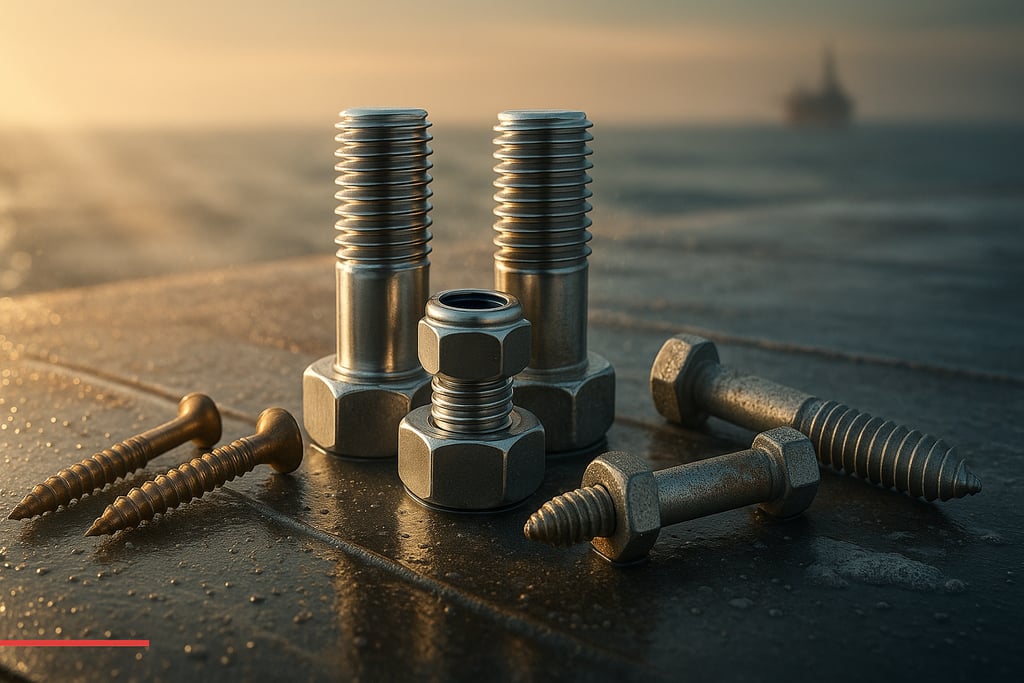What Are Marine Fasteners? A Complete Guide for Coastal and Offshore Applications
Discover marine fasteners designed for coastal and offshore use. Learn about corrosion-resistant materials, types, and applications in saltwater environments.
PRODUCT-SPECIFIC BLOGS


Introduction: Why Marine Fasteners Matter in Coastal and Offshore Projects
Whether you’re building a floating dock in Oman, maintaining an oil rig in the UAE, or outfitting a vessel in Saudi Arabia — marine fasteners are the unsung heroes that hold everything together. These specialized components are designed to withstand the harshest of environments — salt-laden air, water exposure, and corrosive elements found in offshore and coastal regions.
Not all fasteners are created equal. Using standard hardware in marine environments can lead to premature corrosion, structural failure, and costly repairs. That’s why Bait Alnuhas, a leading fasteners supplier in the GCC, ensures that professionals in maritime, oil & gas, and construction sectors have access to marine-grade fasteners engineered for longevity and reliability.
In this guide, we’ll break down the types of marine fasteners, the best materials to use, how to resist saltwater corrosion, and real-world applications from across the Gulf.
Types of Marine Fasteners: Built to Endure the Elements
Marine fasteners aren’t a single product — they’re a family of hardware engineered to endure corrosive, high-moisture conditions.
⚙️ Marine Bolts & Nuts
Use Case: Structural joints on ships, bridges, marine platforms
Typically made from 316 stainless steel or silicon bronze
Found in hull assemblies, dock construction, and underwater joints
🛠️ Marine Screws
Use Case: Decking, boat fittings, HVAC and control panel installations
Self-tapping screws for fiberglass or wood
Coated or stainless variants for long-term durability
🔩 Washers
Use Case: Even load distribution and corrosion protection
Nylon or stainless steel 316 preferred to avoid galvanic reactions
🔧 Rivets
Use Case: Boat hulls, marine sheet metal work
Blind rivets or pop rivets often used in tight, non-accessible spaces
Require non-corrosive materials for marine-grade sealing
✅ Pro Tip from Bait Alnuhas: For marine fasteners that last, always opt for 316 stainless steel — it's the gold standard for saltwater environments.
Corrosion Resistance in Saltwater: What You Must Know
Saltwater is brutal on metal — causing rust, pitting, and degradation through electrochemical reactions like galvanic corrosion. When dissimilar metals are used together, the more reactive one corrodes faster.
💧 Common Corrosion Issues
Surface rust on low-grade stainless steel
Pitting corrosion on fasteners exposed to stagnant saltwater
Galvanic corrosion between incompatible metals (e.g., using zinc-coated fasteners with aluminum)
🧰 Rust Prevention Tips
Use matching metals (e.g., stainless steel with stainless steel)
Apply anti-corrosion paste or sealants
Choose non-conductive washers to insulate metals
Regular inspection and maintenance
⚠️ Many failures in marine construction happen not because the fasteners weren’t strong — but because they weren’t resistant.
Real-World Applications in Coastal and Offshore Projects
Bait Alnuhas serves a range of industries that rely heavily on marine fasteners:
🌊 Shipbuilding & Boat Repair
Stainless marine bolts and rivets are used in hull fastening, propeller assemblies, and decking.
🛳️ Offshore Oil & Gas Platforms
On rigs across Saudi Arabia and the UAE, 316 fasteners resist the aggressive environment of salt spray and high-pressure systems.
🏗️ Coastal Construction
From harbors in Oman to floating docks in Bahrain, builders rely on galvanized and marine-grade screws for structural longevity.
⚓ Marine Electrical Systems
Marine screws and locknuts are critical in securing weatherproof enclosures and junction boxes in high-humidity conditions.
Choosing the Right Fastener Supplier: Why Bait Alnuhas Leads the Gulf
With over a decade of experience supplying to the GCC’s toughest coastal conditions, Bait Alnuhas is the trusted name for marine-grade fasteners. Our clients include:
Offshore drilling contractors in Abu Dhabi
Marine construction companies in Muscat
Shipping & logistics firms in Dammam
Boat manufacturers in Sharjah
What Sets Bait Alnuhas Apart:
Wide inventory of 316 stainless, silicon bronze, and titanium fasteners
Custom export packaging for marine environments
Compliance with ISO, ASTM, and DIN standards
Technical support and material certifications on request
🧭 When your project is surrounded by saltwater and wind, trust the supplier that understands marine resilience.
🔗 Explore our Marine Fasteners Collection or connect with our technical team for tailored solutions.
FAQs: Common Questions About Marine Fasteners
Q1: Can stainless steel rust in saltwater?
A: Yes, if it’s not 316 stainless steel. Lower grades like 304 can develop rust in marine environments. Always confirm the alloy type.
Q2: What’s the best fastener material for saltwater?
A: 316 stainless steel is the most common, followed by silicon bronze and titanium for extreme durability.
Q3: Can I use galvanized fasteners near the sea?
A: You can, but they’re not ideal for long-term exposure. The zinc coating will eventually corrode, exposing the steel underneath.
Conclusion: Build with Confidence — Build with Bait Alnuhas
Marine construction, coastal infrastructure, and offshore engineering all have one thing in common: they demand fasteners that don’t fail under pressure or corrosion. Whether you're building a marina in Fujairah or an offshore plant in Jubail, trust in marine fasteners from Bait Alnuhas to deliver peace of mind.
📞 Contact Bait Alnuhas today to discuss your next project or explore our full catalog of saltwater-resistant fasteners.
